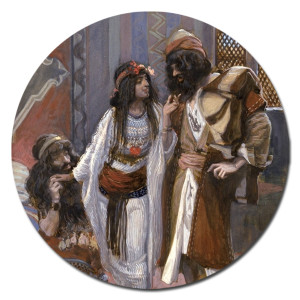We have gone through eight of the apostles. I have focused on their martyrdom and given links to dramatic depictions from Baroque art. Apostle after apostle.
Christian or non-Christian; mature Christian or just beginning your walk with Christ; you ask yourself questions about what happened to the Apostles: Why would I sign up for this? Is this a Christian’s idea of a good time? What would I do under the same circumstances? Does Jesus intend for me to undergo similar treatment?
James the Greater and his brother John ask Jesus a question. Jesus answers in Mark 10:35-40:
35 And James and John, the sons of Zebedee, came up to him and said to him, “Teacher, we want you to do for us whatever we ask of you.” 36 And he said to them, “What do you want me to do for you?” 37 And they said to him, “Grant us to sit, one at your right hand and one at your left, in your glory.” 38 Jesus said to them, “You do not know what you are asking. Are you able to drink the cup that I drink, or to be baptized with the baptism with which I am baptized?” 39 And they said to him, “We are able.” And Jesus said to them, “The cup that I drink you will drink, and with the baptism with which I am baptized, you will be baptized, 40 but to sit at my right hand or at my left is not mine to grant, but it is for those for whom it has been prepared.”
The eleven apostles with the addition of Matthias did drink the cup that Jesus drank. Inspired by the resurrection and the Holy Spirit, they faithfully lived out the will of God, in most cases, to the point of martyrdom.
But what about us? What do we learn from the All Saints window? Let’s look at two different answers beginning with Stephen Covey.
Stephen Covey wrote a book called The 7 Habits of Highly Effective People. First published in 1989 it is a classic in the business world. The basic premise is that there are universal principles that govern human effectiveness. They are in essence natural laws that cannot be broken without causing us to become less effective. If you align your values with these principles, you will be more effective. Lots of folks in the business world improved their careers by applying this book to their lives.
The second habit of the seven habits is to: Begin with the end in mind. Stephen writes: “Although Habit 2 applies to many different circumstances and levels of life, the most fundamental application of ‘begin with the end in mind’ is to begin today with the image, picture, or paradigm of the end of your life as your frame of reference or the criterion by which everything else is examined.”
As part of this habit you are asked to go through an exercise where you consider what family, friends, co-workers, and community would say about you at your funeral. By reflecting on this you gain an understanding of what the center of your life is. In other words, what is your main focus in life: Money, work, possessions, pleasure, family, etc? Once that is understood, the goal is to move your central focus to a principle centered paradigm. In other words your center should be focused on things like fairness, honesty, excellence, growth, etc. Doing this will lead to a more balanced and effective life.
I read the book 1994. I was rising quickly through the ranks of management in Silicon Valley and making a lot of money. When I did the habit 2 exercise I discovered I was off the scale work focused. Disillusioned, I quit my job and began a slow journey to Christ.
For me, if I do the funeral exercise while looking at the All Saints window I am not real excited about beginning with the end in mind. I do not want to wake up tomorrow and picture myself being martyred. It doesn’t work for me.
My guess is that it wouldn’t have worked for the Apostles either. Yet these men were chosen by Jesus to begin the Great Commission. They must have been highly effective in spreading the gospel. What was their center? What image did they hold in their minds?
A different habit is given in Hebrews 11. Hebrews 11 is sometimes called the honor roll of the Heroes and Heroines of Faith. Included in the list are Abel, Enoch, Noah, Abraham, Sarah, Isaac, Jacob, Joseph, Moses, Rahab the Harlot, Gideon, Barak, Samson, Jephthah, David, Samuel, the prophets, those persecuted and martyred.
Part way through the honor roll, the author of the Book of Hebrews writes in chapter 11:
13 These all died in faith, not having received the things promised, but having seen them and greeted them from afar, and having acknowledged that they were strangers and exiles on the earth. 14 For people who speak thus make it clear that they are seeking a homeland. 15 If they had been thinking of that land from which they had gone out, they would have had opportunity to return. 16 But as it is, they desire a better country, that is, a heavenly one. Therefore God is not ashamed to be called their God, for he has prepared for them a city.
These men and women looked forward to the City of God, the heavenly Jerusalem, the place Christ is preparing for us. Their focus was not on the end. Their focus was on a new beginning with their Lord. They lived out lives of faith and obedience focused on that new beginning knowing that God had something better for them.
The author of Hebrews writes at the beginning of the same chapter:
11 Now faith is the assurance of things hoped for, the conviction of things not seen. 2 For by it the people of old received their commendation.
Let’s look at Rahab the Harlot. Yes, having, the harlot, appended to your first name makes the name James the Less not feel quite as bad. Rabab would have failed the actual funeral exercise of Habit 2. The Jericho community and her Canaanite friends would have said something on the order of: “That manipulative harlot lied and sold us out to a couple of spies. Because of that filthy woman most of us died in the conquest of Jericho. May she ever be remembered as a prostitute.”
Rahab believed in the God of Israel despite the difficult situation and responded. Her faith was oriented towards the future and she demonstrated it by welcoming Joshua’s spies and, at risk, hid them saying in Joshua chapter 2:
11 “…for the Lord your God, he is God in the heavens above and on the earth beneath.”
To her, the victory at Jericho was a foregone conclusion. Her faith in the God of Israel caused her to behave as she did. She received Divine approval for her faith.
But there is more to Rahab the Harlot. Far from being textbook Stephen Covey habit 2 approved, Rahab made the list of the heroes of Faith in Hebrews 11. She is mentioned in the same breath as Abraham and Moses. Rahab is also mentioned in the book of James. And even more profound, she is mentioned at the beginning of the book of Matthew in the genealogy of Jesus.
Rahab, like the Apostles we are reviewing, had eyes of faith that saw beyond the end to something better in the new beginning.
By faith, Rahab began with the beginning in mind.
Similarly, the Apostles often did not get approval from earthly rulers and tradition holds that in many cases their lives ended painfully as a result. The Apostles, by faith, did receive approval from a Divine source.
The image shown is a portion of a painting entitled The Harlot of Jericho and the Two Spies by James Tissot.
In part 13, we move to Simon the Zealot at the 9 o’clock position.

